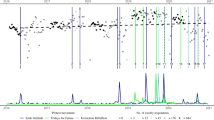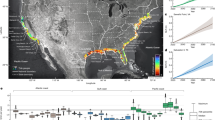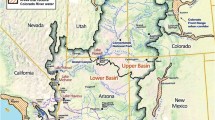Abstract
Under the Paris Agreement nations made pledges known as nationally determined contributions (NDCs), which indicate how national governments are evaluating climate risks and policy opportunities. We find that NDCs reveal important systematic patterns reflecting national interests and capabilities. Because the ocean plays critical roles in climate mitigation and adaptation, we created a quantitative marine focus factor (MFF) to evaluate how governments address marine issues. In contrast to the past, when oceans received minimal attention in climate negotiations, 70% of 161 NDCs we analysed include marine issues. The percentage of the population living in low-lying areas—vulnerable to rising seas—positively influences the MFF, but negotiating group (Annex 1 or small island developing states) is equally important, suggesting political motivations are crucial to NDC development. The analysis reveals gaps between scientific and government attention, including on ocean deoxygenation, which is barely mentioned. Governments display a keen interest in expanding marine research on climate priorities.
This is a preview of subscription content, access via your institution
Access options
Access Nature and 54 other Nature Portfolio journals
Get Nature+, our best-value online-access subscription
$29.99 / 30 days
cancel any time
Subscribe to this journal
Receive 12 print issues and online access
$209.00 per year
only $17.42 per issue
Buy this article
- Purchase on Springer Link
- Instant access to full article PDF
Prices may be subject to local taxes which are calculated during checkout




Similar content being viewed by others
References
Paris Agreement (UNFCCC, 2016).
Bodansky, D. The Paris Climate Change Agreement: A new hope? Am. J. Int. Law 110, 288–319 (2016).
Lesnikowski, A., Ford, J., Biesbroek, R., Berrang-Ford, L. & Heymann, S. J. National-level progress on adaptation. Nat. Clim. Change 6, 261–264 (2016).
Pörtner, H.-O. et al. in IPCC Climate Change 2014: Impacts, Adaptation, and Vulnerability (eds Field, C.B. et al.) 411–484 (IPCC, Cambridge Univ. Press, 2014).
Hoegh-Guldberg, O. & Bruno, J. F. The impact of climate change on the world’s marine ecosystems. Science 328, 1523–1528.
Eddebbar, Y. A., Gallo, N. D. & Linsmayer, L. B. The oceans and the UN framework convention on climate change. L&O Bull. 5, 69–72 (2015).
Galland, G., Harrould-Kolieb, E. & Herr, D. The ocean and climate change policy. Clim. Policy 12, 764–771 (2012).
United Nations Framework Convention on Climate Change (UNFCCC, 1992).
Gattuso, J. P. An Ocean Scientist at COP21. L&O Bull. 25, 15–17 (2016).
Chilean Ministry of Foreign Affairs. Because the Ocean Declaration (Institute for Sustainable Development (IDDRI), 2015); http://www.iddri.org/Themes/Because-the-Ocean-ENG.pdf
Kyoto Protocol (UNFCCC, 1997).
Keohane, R. O. & Victor, D. G. Cooperation and discord in global climate policy. Nat. Clim. Change 6, 570–575 (2016).
INDC Portal (UNFCCC, 2015); http://www4.unfccc.int/submissions/indc/Submission%20Pages/submissions.aspx
The Intended Nationally Determined Contribution Submission by Latvia and the European Commission on Behalf of the European Union and Its Member States (UNFCCC, 2015).
Costanza, R. et al. The value of the world’s ecosystem services and natural capital. Nature 387, 253–260 (1997).
Barbier, E. B. et al. The value of estuarine and coastal ecosystem services. Ecol. Monogr. 81, 169–193.
Mcleod, E. et al. A blueprint for blue carbon: toward an improved understanding of the role of vegetated coastal habitats in sequestering CO2 . Front. Ecol. Environ. 9, 552–560 (2011).
Alongi, D. M. Carbon sequestration in mangrove forests. Carbon Manage. 3, 313–322 (2012).
Herr, D. & Landis, E. Coastal Blue Carbon Ecosystems: Opportunities for Nationally Determined Contributions (International Union for Conservation of Nature, The Nature Conservancy, 2016).
Bopp, L. et al. Multiple stressors of ocean ecosystems in the 21st century: projections with CMIP5 models. Biogeosciences 10, 6225–6245 (2013).
Mora, C. et al. Biotic and human vulnerability to projected changes in ocean biogeochemistry over the 21st Century. PLoS Biol. 11, e1001682 (2013).
Gruber, N. Warming up, turning sour, losing breath: ocean biogeochemistry under global change. Phil. Trans. R. Soc. A 369, 1980–1996 (2011).
Schmidtko, S., Stramma, L. & Visbeck, M. Decline in global oceanic oxygen content during the past five decades. Nature 542, 335–339 (2017).
Keeling, R. F., Körtzinger, A. & Gruber, N. Ocean deoxygenation in a warming world. Annu. Rev. Mar. Sci. 2, 199–229 (2010).
Gilly, W. F., Beman, J. M., Litvin, S. Y. & Robison, B. H. Oceanographic and biological effects of shoaling of the oxygen minimum zone. Annu. Rev. Mar. Sci. 5, 393–420 (2013).
Wong, P. P. Small island developing states. WIREs Clim. Change 2, 1–6 (2011).
Schipper, E. L. F. Conceptual history of adaptation in the UNFCCC process. RECIEL 15, 82–92 (2006).
Pielke, R., Prins, G., Rayner, S. & Sarewitz, D. Lifting the taboo on adaptation. Nature 445, 597–598 (2007).
Allison, E. H. et al. Vulnerability of national economies to the impacts of climate change on fisheries. Fish Fish. 10, 173–196 (2009).
Lam, V. W. Y., Cheung, W. W. L., Reygondeau, G. & Sumaila, U. R. Projected change in global fisheries revenues under climate change. Sci. Rep. 6, 32607 (2016).
Halpern, B. S. et al. An index to assess the health and benefits of the global ocean. Nature 488, 615–620 (2012).
Halpern, B. S. et al. Patterns and emerging trends in global ocean health. PLoS ONE 10, e0117863 (2015).
Gupta, J. A history of international climate change policy. WIREs Clim. Change 1, 636–653 (2010).
Najam, A., Huq, S. & Sokona, Y. Climate negotiations beyond Kyoto: developing countries concerns and interests. Clim. Policy 3, 221–231 (2003).
Ashe, J. W., Lierop, R. V. & Cherian, A. The role of the Alliance of Small Island States (AOSIS) in the negotiation of the United Nations Framework Convention on Climate Change (UNFCCC). Nat. Resour. Forum 23, 209–220 (1999).
Betzold, C. “Borrowing” power to influence international negotiations: AOSIS in the climate change regime, 1990–1997. Politics 30, 131–148 (2010).
Thiele, T. Accelerating impact, the promise of blue finance. Cornerstone J. Sustain. Financ. Bank. II, 21–22 (2015).
Levin, L. A. & Le Bris, N. The deep ocean under climate change. Science 350, 766–768 (2015).
Magnan, A. K. et al. Implications of the Paris agreement for the ocean. Nat. Clim. Change 6, 732–735 (2016).
Gattuso, J.-P. et al. Contrasting futures for ocean and society from different anthropogenic CO2 emissions scenarios. Science 349, aac4722 (2015).
Cheung, W. W. L., Reygondeau, G. & Frölicher, T. L. Large benefits to marine fisheries of meeting the 1.5 °C global warming target. Science 354, 1591–1594 (2016).
Elimelech, M. & Phillip, W. A. The future of seawater desalination: energy, technology, and the environment. Science 333, 712–717 (2011).
Cicin-Sain, B. et al. Towards a Strategic Action Roadmap on Oceans and Climate: 2016 to 2021 (Global Ocean Forum, 2016).
Submission from Chile to the UNFCCC Submission on the Relevance of the Ocean in the Global Response to Climate Change (2016); http://go.nature.com/2yi47y8
Petes, L. E., Howard, J. F., Helmuth, B. S. & Fly, E. K. Science integration into US climate and ocean policy. Nat. Clim. Change 4, 671–677 (2014).
Indicators: World Bank (accessed 20 September 2016); http://data.worldbank.org/indicator
Sea Around Us: Fisheries, Ecosystems and Biodiversity (accessed 15 September 2016); http://www.seaaroundus.org/data/#/eez
R Development Core Team R: A Language and Environment for statistical computing. R Foundation for Statistical Computing ISBN 3-900051-07-0 (2008).
Symonds, M. R. E. & Moussalli, A. A brief guide to model selection, multimodel inference and model averaging in behavioural ecology using Akaike’s information criterion. Behav. Ecol. Sociobiol. 65, 13–21 (2011).
Mazerolle, M. J. AICcmodavg: Model Selection and Multimodel Inference Based on (Q)AIC(c). R Package Version 2.0-4 (2016).
Fletcher, T. D. QuantPsych: Quantitative Psychology Tools. R Package Version 1.5 (2012).
Lüdecke, D. sjPlot: Data Visualization for Statistics in Social Science. R Package Version 2.1.1 (2016).
Wickham, H. ggplot2: Elegant Graphics for Data Analysis (Springer, 2009).
Gallo, N. D., Victor, D. G. & Levin, L. A. Raw Dataset for Ocean Commitments under the Paris Agreement (Zenodo, 2017); http://dx.doi.org/10.5281/zenodo.845500
Acknowledgements
We thank L. Ras, M. Beckwith and Y. Eddebbar for assistance with analysing NDCs that were unavailable in English, B. Semmens for statistical advice, I. Rhee and A. Giron for assistance with data presentation, R. Norris for comments, C. Turley, H.-O. Pörtner, B. Cicin-Sain, J. Cordano and R. Jumeau for insightful discussion, and A. van der Graaf, O. Aburto, T. Whitty and S. Verma for use of photographs. N.D.G. was supported by National Science Foundation Graduate Research Fellowship under Grant no. DGE-1144086. Any opinion, findings, and conclusions or recommendations expressed in this material are those of the authors and do not necessarily reflect the views of the National Science Foundation.
Author information
Authors and Affiliations
Contributions
N.D.G. performed the analysis and wrote the manuscript, D.G.V. and L.A.L. contributed equally in providing guidance on the analysis and revising the manuscript.
Corresponding author
Ethics declarations
Competing interests
The authors declare no competing financial interests.
Supplementary information
Supplementary Information
Supplementary Information (PDF 1600 kb)
Rights and permissions
About this article
Cite this article
Gallo, N., Victor, D. & Levin, L. Ocean commitments under the Paris Agreement. Nature Clim Change 7, 833–838 (2017). https://doi.org/10.1038/nclimate3422
Received:
Accepted:
Published:
Issue Date:
DOI: https://doi.org/10.1038/nclimate3422
This article is cited by
-
Research on hotspots and evolutionary trends of blue carbon sinks: a bibliometric analysis based on CiteSpace
Environment, Development and Sustainability (2024)
-
Evidence-based target setting informs blue carbon strategies for nationally determined contributions
Nature Ecology & Evolution (2023)
-
Population growth, family planning and the Paris Agreement: an assessment of the nationally determined contributions (NDCs)
International Environmental Agreements: Politics, Law and Economics (2022)
-
Wave of unity
Nature Climate Change (2021)
-
Climate action requires new accounting guidance and governance frameworks to manage carbon in shelf seas
Nature Communications (2020)



